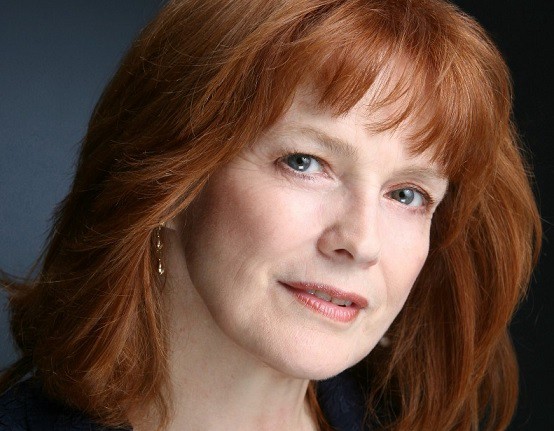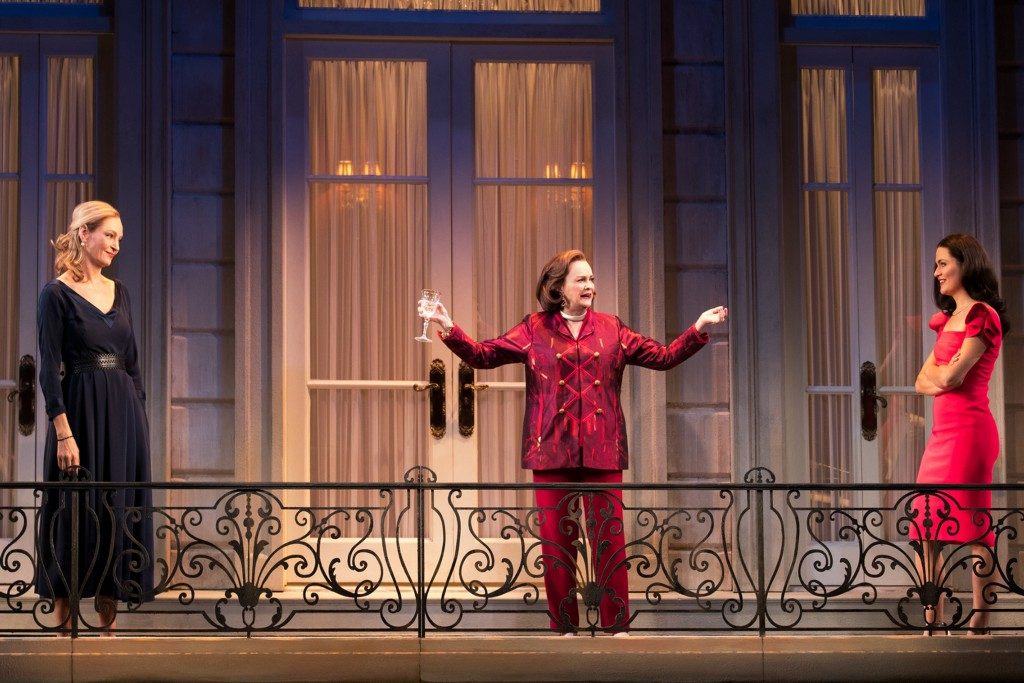
In “The Parisian Woman,” which is now playing on Broadway, actress Blair Brown plays the newly-appointed head of the Federal Reserve Bank. Her conservative character is embroiled in a Washington scandal that involves her daughter (Phillipa Soo) and a socialite (Uma Thurman).
Blair’s credits include TV series such as “The Days and Nights of Molly Dodd,” “Fringe,” and “Orange Is the New Black” and films “Altered States,” “Continental Divide,” and “Dogville.” She’s also worked extensively in theater, and won a Tony Award in 2000 for her role in “Copenhagen.”
We spoke to Brown about her new play, what it’s like to be a woman in Hollywood over 40, and her thoughts on the #MeToo movement.
“The Parisian Woman” is playing in a limited run at the Hudson Theatre. The play was written by “House of Cards” creator Beau Willimon and is directed by Pam MacKinnon (“Who’s Afraid of Virginia Woolf?”)
W&H: How did “The Parisian Woman” enter your life?
BB: A while ago, I saw the play “Bach at Leipsig,” written by Itamar Moses [of “The Band’s Visit”] and directed by Pam [MacKinnon] at the New York Theatre Workshop and thought it was exquisitely directed — very precise, delicate, and smart.
I was a fan of Pam from the beginning and have watched her grow from being that younger theater director to a full blown, confident stage director. We’d always wanted to work together and just never found the time or place. Then this play came along.
W&H: Talk about the play’s evolution.
BB: I’d been reading the play for a year and a half before we started. Beau has since tweaked it. Before it was a kind of a status quo look at politics, kind of “House of Cards”-like in that way — smart, funny, sexy, provocative, but still a kind of cynical look at the world.
It’s now become a cautionary tale. It’s about people searching for their moral compass rather than people who just chuck aside looking for an ethical and moral life. Tom represents the law; Peter represents business; I represent government; my daughter, Rebecca, is the advocate; and Uma is the intellectual observer.
W&H: MacKinnon recently told Women and Hollywood that sometimes when you’re saying your lines, you stop and say out loud that it’s something that you’d never say.
BB: Most of what [my character] Jeanette says is the antithesis of what I think. It was actually very hard for me to learn some of her Republican speak because my brain simply refuses to accept it. It was almost like a foreign language.
W&H: Where did you go for inspiration to play someone so different from yourself?
BB: I grew up in Washington so I had a lot of role models. My parents were Republicans. My mother said she was Independent but she never voted for anyone but Republicans. My partner is in business and he deals with a lot of Republicans, many of whom I quite like, others I don’t at all. It’s that…notion of [putting] yourself in the room with your nemesis and [figuring out] where you are going to start [to find common ground]. Jeanette’s a really good mother. I think that if [the story] went on, it’s my fancy that she would actually support her daughter being a lesbian. It was just always out of her realm. Now it’s there and she loves her daughter and she’ll do whatever it takes to protect her. That’s part of who she is.
W&H: How relevant is the play to today’s political climate?
BB: The play feels different as the weeks go by. That mindset that we can’t rip the party apart, which we are hearing about every day, is real. When we read it in December, a year ago, [the character] Tom was trying to get access to Reince Priebus and the person who threw up on my sofa was General Flynn. There was no General Kelly then.
W&H: What’s it like being involved in the twist that turns the play so dramatically in the second act?
BB: I feel like I’m in a melodrama! Audiences are sometimes hugely vocal during the act. I’ve never had that experience. I’m glad Beau put me in this part of the play.
W&H: What’s it like working with Uma Thurman and the rest of the cast?
BB: It’s a total treat, actually. We’re five very different people and the getting-to-know-you process has been really rich for all of us.
Uma did an off-Broadway play 15 years ago, [“The Misanthrope” at the Classic Stage Company]. It’s very brave of her to take this on now. She has a deep wisdom about people. She’s also unabashed and between her and Pam’s style, anyone can suggest anything. That’s the best way to work.
W&H: You starred in “The Days and Nights of Molly Dodd,” a groundbreaking show for women in the ‘80s, and now you have a role in another groundbreaking show, “Orange Is the New Black.” Can you touch on what’s it like then versus now?
BB: “Molly” was my first series and it was so extraordinary. I thought every show would be like it. It was very collaborative with the crew and Jay Tarses, [the show’s creator], kept saying that our collaboration was rare. He was absolutely right — I never had that experience ever again. They are mainly very boy-run shows [and] writing rooms in Los Angeles. On “Fringe” we started out with three very interesting female characters. By the third year, we were all basically caretaking some male character. A father and son is more interesting than a mother and daughter in a lot of male writing rooms. It made me feel empty. I was getting worn out.
“Orange” has renewed my faith in working in television. It made me love acting again and has really renewed my spirit. The cast is a diverse group of people in every way. Lea [DeLaria] is a stand-up comedian; I went to drama school; Danielle [Brooks] and Samira [Wiley] went to Julliard; some people on the show have never been to acting school. But when you get on the set, everyone is the same and there are no mistakes to be made. You can try anything. It was completely exciting.
When you do these hour-long shows, you never know ahead of time about your next scene. But I have grown to like that. You kind of wait, pick up a script and say, “Okay, I’m having a three-way! You could have told me that ahead of time.” But there it was and in context, it was completely right. I love that spirit of [the show’s creator,] Jenji [Kohan] — she just takes everything and flips it.
W&H: What is it like being a woman in Hollywood today, particularly in light of the #MeToo movement?
BB: My livelihood was never threatened and I feel very lucky that way. But I know that it’s happening in every country in the world to some woman or some young man at this very moment. I just wish that this conversation could get larger, and I know that men have to be part of it.
At Columbia University a few years ago, there was a big sexual harassment case. Boys had to go through a sexual sensitivity course and girls were not part of it. Women were being branded as victims and had no participation. This wasn’t victim-bashing; it was just saying everyone needs to be in on the conversation because it’s a two-way street.
W&H: Where do you see the solution?
BB: We have to keep talking. We have to raise our girls and boys better so they pay attention. These things are always going to happen, but we need better ways to deal with it. We can’t have these kinds of situations where women are so threatened physically that their livelihoods are at stake.
Fortunately, it’s good that it started with this Hollywood monster because we get press for it. If it was a guy in the insurance business, we would not be hearing about it.
W&H: Is it getting easier for women over 40 in Hollywood?
BB: Yes, it’s definitely getting easier than it was 10 years ago. These characters I’m getting to play weren’t around before. That whole group of actresses that existed then didn’t get to play them.
But it’s never been fun for a woman in Hollywood. If you’re young, you have the issue of being attractive. Young character actresses don’t have much work when they’re young so all the pretty girls are working and you’re being treated as “the girl” all the time. You have to stay desirable and likable. Being older was a liability. Now even though there may be fewer parts when you’re older, they’re just much better parts.






